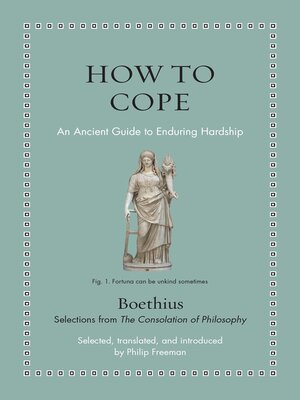How to Cope
ebook ∣ An Ancient Guide to Enduring Hardship · Ancient Wisdom for Modern Readers
By Boethius

Sign up to save your library
With an OverDrive account, you can save your favorite libraries for at-a-glance information about availability. Find out more about OverDrive accounts.
Find this title in Libby, the library reading app by OverDrive.



Search for a digital library with this title
Title found at these libraries:
| Library Name | Distance |
|---|---|
| Loading... |
A vivid and accessible new translation of essential selections from Boethius's Consolation of Philosophy—a moving classic about facing life's worst events with courage and hope
What do you do when your life has fallen apart? Fifteen hundred years ago, a Roman nobleman named Boethius (ca. 480–524 CE) asked this question as he was sitting in a prison cell waiting to die, accused—probably unjustly—of treason. Boethius had been a rich and powerful man with all a person could want in life, but now he had lost everything. Shaken, he wondered how such terrible misfortune could have happened to him and why life was so unfair. When Philosophy herself appears in his cell and confronts Boethius, the conversation that follows between the two on the nature of evil and why humans suffer is as powerful and inspiring today as it was to its first readers. In How to Cope, Philip Freeman presents a lively modern translation of essential selections from Boethius's classic, complete with an introduction and the original Latin on facing pages.
This translation vividly captures Boethius's journey from bitterness and anger to reconciliation and peace, showing how ancient philosophy, especially Stoicism, can help readers deal with adversity in their own lives. The book reveals the qualities that have made The Consolation of Philosophy one of the most popular and influential works of classical and world literature, and an inspiration to countless writers, including Thomas Aquinas, Dante, and Chaucer.







